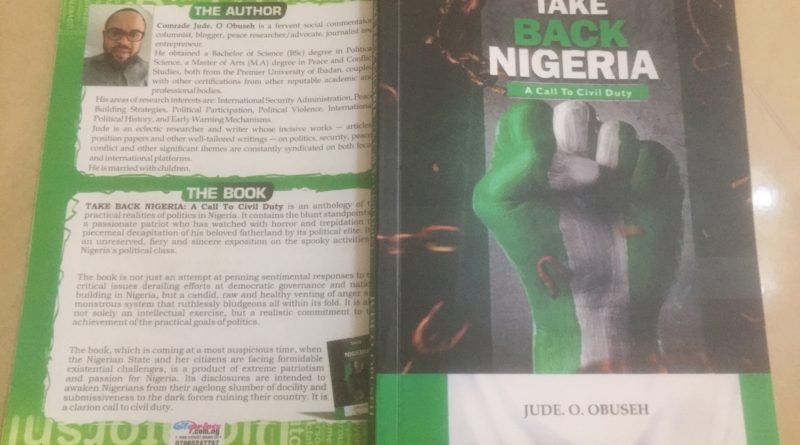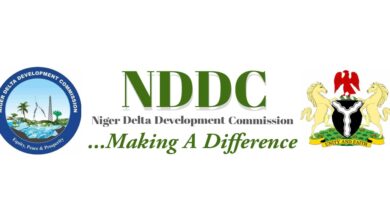Take Back Nigeria: A Call To Civil Duty, By CBN Ogbogbo
Book preview
By CBN Ogbogbo
Book Title: Take Back Nigeria: A Call To Civil Duty
Author Jude .O.Obuseh
Genre: Political Essay
Format: Paperback
Publisher: JOVAB Publishers, Benin City
PP: 170
Nigeria is again at the precipice; a situation that she has found herself on several occasions within her short history of existence as a country. There is a dangerous massive youth unemployment that is left unattended. There is the spate of killings of innocent Nigerians by murderous unidentified rampaging marauders and the Nigerian State seems helpless and unable to put a stop to it. Corruption has reached an all-time high with a devastating consequence on the economy. Indeed, contemporary life in the country has become short, nasty and brutish. The political leaders remain both clueless and unperturbed about the myriad of problems confronting the country. It is against this background of catastrophic season of anomy and the increasing hopelessness that this book can be best understood.
The book, Take Back Nigeria: A Call To Civil Duty, is the product of extreme love and passion for Nigeria, as well as a disappointment with the historical trajectories that have been the lot of the failing state. It is expected that the book, in its revelations, will serve as shock treatment that should jolt Nigerians from the slumber of indifference and inaction.
Jude Obuseh’s piece is coming at a most auspicious time when the Nigerian State and her citizens are facing humungous and debilitating challenges. Plagued by a number of existential problems: the current failure of leadership, the growing discontent with the deformed democratic governance, the wanton destruction of lives and property by the lethal ‘Fulani herdsmen’, the abject poverty and tattered penury of the majority of Nigerians all converge as the triggers for Obuseh’s engagement with Nigeria. In a feat of exasperation, he asserts that he is ‘absolutely upset and disgusted with the shambolic state of affairs in our beloved country’.
His motivation stems from a failed dream and optimism that have generated a holy anger against the political elite in the country. The vituperations are indeed weighty punches that have been masterly delivered by a well-trained Political Scientist whose knowledge of Nigerian History is commendable. Even in his rage and frenzy, Obuseh is systematic in identifying and analysing the challenges that have kept the giant Nigeria crippled. Rather than pick up arms, the author has chosen the pen in unmasking that which he feels requires exposure, in the conviction that educating the citizenry is a critical aspect of finding a panacea for the protracted problems of the country.
He locates the origins of what could be termed the ‘Nigerian Crisis’ in her pre-colonial, colonial and post-colonial developments. He begins the delivery of his punches, first, with the colonial state and then with Nigeria’s post- independence leaders. He argues that the country is reaping the mistakes of the earlier generations. The contemporary pains are the products of injuries sustained from the country’s historical past. He interrogates the vexed question of whether the creation of Nigeria is the mistake of 1914? After a thorough analysis, he is emphatic in his ‘No’ answer. He posits that there may have been challenges but they are surmountable.
Another interesting bit in the text is the call for restructuring the polity. Or more appropriately, the need for ‘refederalisation’. He is convinced that this necessary political re-tooling is what is required to get Nigeria out of its current quagmire.
There is yet again a fascinating dimension, the advocacy for a non-violent path to changing the status quo. Again, the pacifist in him is shown. He abhors the use of force in tackling the myriad of problems that confront Nigerians and the Nigerian State. In spite of his palpable anger, the author has not given up the task of effecting a positive change and finding solutions to the identified problems. He calls for the citizenry to imbibe the spirit of patriotism and nationalism. While on the part of the State, it must promote the values of equity, justice and fair play as its cardinal principles.
The book is a testimony to the painstaking collection of facts and their rendition with an alert and analytical mind. It is in Obuseh’s anger, the methodological approach in unmasking the problems, the incisive analysis and the recommendation of bloodless solutions that give one hope that all is not lost in the task of forging a new Nigeria.
C.B.N. Ogbogbo is a Professor of African History, University of Ibadan.
For Enquiries, Call: 08168580211, or Email: idachabamagnus@yahoo.com




